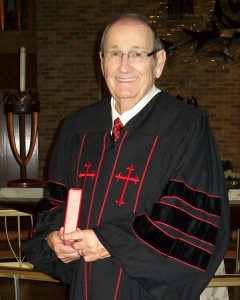
Some of the statements that Jesus said aren’t’ very popular—words like, “Love your enemy,” or, “Love your neighbor,” or, “Forgive us as we forgive others.” As the old cliché puts it: “That’s easier said than done.” Life offers us many opportunities to love and forgive; and to move on. But for many people, holding onto a grudge seems to be the road they travel. The Lenten seasons reminds us of many great truths. Jesus looked down from the cross and said, “Father, forgive them, for they know not what they do.” What a challenge to us to forgive a person, but much of the world, it seems, lives by “an eye for an eye and a tooth for a tooth.” It’s a wonder more and more people aren’t eyeless and toothless.
Forgiveness is therapeutic. It’s healthy. When we are at odds with a person and continue to nurture our hurt feelings, it affects our bones, blood pressure and causes headaches and heartaches. Our emotions are tied to our physical well-being. Unforgiving can make you sick. In fact, unforgiveness, anger, hatred and resentments can actually kill you, according to a study by Johns Hopkins University. These negative emotions are cardio-toxic. They get into your bloodstream.
As Gerald L. Sittser points out in his book A Grace Disguised, forgiveness is to live in God’s Grace. Grace is Grace only when it is undeserved. Sittser goes on to cite as an example, Victor Hugo’s Les Miserables, the story of Jean Valjean, a man who spends nineteen years in prison for stealing a loaf of bread and then trying to escape. This turned him into a hateful, bitter man who was rejected by nineteenth century French society. Outcast and homeless, he seeks lodging one night at the home of a Catholic bishop, who treats him with genuine kindness, which Valjean sees as an opportunity to exploit. In the middle of the night, he steals most of the bishop’s silver but is caught by the police as he tries to make his escape. When the officers return Valjean to the bishop’s residence for identification, they are surprised to see the bishop hand two additional silver candlesticks to Valjean, saying, “You forgot these,” implying that the silver had been a gift. After dismissing the police, the bishop turns to Valjean and says, “I have bought your soul for God.” In that moment, Valjean’s bitterness is broken. The rest of the story demonstrates the power of forgiveness and a redeemed life. Valjean becomes a different person altogether. He raises and orphan who is entrusted to his care, spares the life of a parole officer who has spent fifteen years hunting him, and saves the life of a young man—his future son-in-law—nearly at the expense of his own life. He fulfills his destiny with joy, returns good for evil wherever he goes, and longingly enters heaven.
Jesus said, “Forgive seventy times seven,” which means to keep on forgiving. Jesus often spoke in hyperboles to make a point. In other words, he didn’t mean to say that you can stop forgiving when you reach 490 times. It takes a big person to say, “I’m sorry,” and really mean it.
Forgiving does not always involve another person. Sometimes, we need to forgive ourselves. When we mess up, make wrong choices, and go against our own values, we need to do what David did in the Old Testament; that is to offer ourselves at the altar of forgiveness and say, “Create within me a clean heart, O God, and renew a right spirit within me,” (Psalm 51:10). David had made a terrible choice, and he was guilty of wrong-doing. He had Uriah sent up to the front lines of battle to be killed so that David could take Bathsheba. It began to eat on him; he couldn’t sleep or eat, so he turned to God in contrite prayer: “Have mercy on me, O God…and wash me from my sin,” (Psalm 51:1-2).
Certain circumstances are so hurtful that forgiveness seems only an ideal that we cannot reach. A friend said to me one day, “I can’t forgive him on my own. I have to let God forgive him through me.” Even so, certain scars are left in our memories or on our bodies, constantly reminding us of some negative situation or abuse. I was in a local restaurant one day, and the server came to my table with a long face. I didn’t know here, but I remarked, “You look worried about something.” She replied that she was really “down”, and had messed up her life and didn’t know where to turn. I put on my “preacher hat”, and said, “I don’t know what’s bothering you, but I bet god has blessed you in many ways and will take this burden off of you, if you let Him.” She looked at me and asked, “Are you some kind of nut or something?” “Yeah, I’m kind of nut or something, but I’m willing to listen,” I replied. She stood at my table and poured her heart out about a failed marriage, etc. By the time I got served my food, I was really hungry, but it was worth the wait.
The best image of God that I know is the father of the prodigal son, who, when his wayward son came home, ran out to meet him with open arms while saying, “This, my son, was lost, but now is found. Go kill the fatted calf and let’s celebrate,” (Luke 15:23-24). This says we don’t have to ear God’s love; all we have to do is to accept it, and then pass it on to other people. Again, Grace is Grace only if it is undeserved. Amen.









